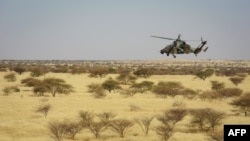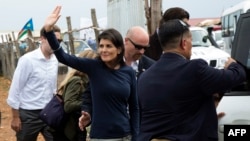An ambush that killed four U.S. Special Forces soldiers in Niger recently drew attention to the deteriorating security situation in parts of the Sahel region of sub-Saharan Africa.
Niger is part of a group of five Sahel nations that is pushing a joint military force to tackle terrorism threats in the region. Defense and foreign ministers on a visit to the United States this week reiterated the dangers they face on a daily basis.
WATCH: G5 Sahel Joint Military Force to Tackle Terrorism
Malian Foreign Minister Abdoulaye Diop, speaking about Tuesday’s ambush on a member of parliament and chairperson of the high court for justice in Mali, says “he was traveling in the region of Tenekou … Mopti. His car and convoy came under attack. It was ambushed. Unfortunately the driver has died as well as five soldiers who came to their rescue.”
Diop notes this kind of attack has become common.
“If we don’t work collectively to provide a response as it was done in the Boko Haram region in the Lake Chad basin, this issue might go out of hand and has a direct impact on international peace.”
Therefore, Diop told VOA, “it’s urgent to deploy the G5 Sahel joint force with the mission to combat terrorism and international organized crime but also the need to work collectively to provide assistance and support to the G5 Sahel.”
Group of Five
The group was set up by Burkina Faso, Chad, Mali, Mauritania and Niger and has its command base is in Sevare, in central Mali. The plan is to coordinate with the United Nations Peacekeeping Mission in Mali (MINUSMA) established in 2013, and France’s anti-insurgent Operation Barkhane.
Burkina Faso’s Foreign Minister Alpha Barry says the work of the G5 Sahel will complement what exists in the region.
“Burkina Faso has about 1,800 soldiers in MINUSMA in Mali, but we think that’s not enough to protect our countries and borders. In 18 months we’ve had 80 attacks, mostly in the borders but two big ones in Ouagadougou, and has caused the death of 134 including some from the West so this is a global threat.”
Barry also says that thousands of children and teachers are missing school in some areas because of fear of terrorist attacks.
White House wants stability
On Monday, the Trump administration expressed its commitment to stabilize the Sahel region and support the G5 counterterrorism efforts.
“We plan to provide up to $60 million in bilateral assistance, which we will work with our Congress to identify to help stand up the joint force,” US ambassador to the U.N. Nikki Haley said.
The bilateral funding was announced as the Security Council met to discuss how to drum up international support for the G5 force.
This support fell short of hopes by France and other nations that Washington would back direct funding from the U.N.
But, Chad Foreign Minister Hissein Brahim Taha welcomed the move, telling VOA, “this is the biggest contribution we’ve gotten so far and we thank the U.S., but we hope that more money will be pledged at our upcoming donor conference meeting in Brussels in December so that this joint force can gear up and declare war on terrorism.”
French Foreign Minister Jean-Yves Le Drian said multilateral backing would be “an important signal of support from the international community to the G5 countries in their struggle against terrorist organizations.”
Commenting on the recent death of four American soldiers, Niger’s Foreign Minister Ibrahim Yacoubou says his government is working with the U.S. to find out what happened.
“We owe it to the family members of the dead soldiers but also for us so we can draw lessons, because this conflict where these soldiers lost their lives is not over,” Yacoubou told VOA.
He added that terrorism has no borders or colors, it’s a global threat that needs to be dealt with — a fight the G5 is committed to wage.
“Until we win the fight against terrorists/narco and human traffickers in northern Mali, they will become more powerful and will only spread further,” he said.


